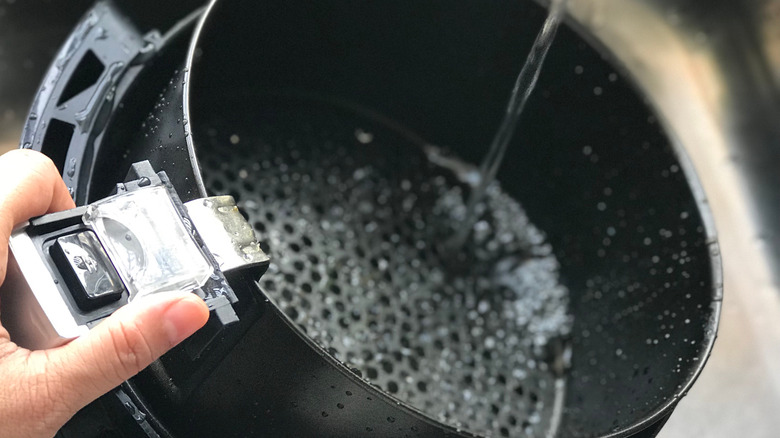Do The Health Benefits Of Using An Air Fryer Outweigh The Risks? What To Consider
Air fryers have become hugely popular among foodies everywhere, offering a healthy, guilt-free alternative to traditional frying methods. These sleek and stylish countertop devices let you indulge in your favorite crispy foods without worrying as much about calories and fats. With air-frying, you only need a tablespoon of oil (per Healthline) instead of drowning food in oil like traditional frying methods. Plus, air-frying has been shown to reduce the formation of harmful compounds often found in deep-fried foods. So you might be able to enjoy delicious, crispy foods with fewer health risks.
However, it's important to remember that along with the health benefits, air fryers can present some risks, too, especially if they're not used and maintained properly. One such risk is the possibility of scratching the nonstick coating with abrasive materials, which may release harmful chemicals into your food.
Potential risks of air fryer usage
One of the key features that make air fryers so popular is their nonstick coating, which prevents food from sticking to the basket and makes cleaning up a breeze. As a study published in 2022 in Science of The Total Environment highlights, cooking with nonstick coatings like Teflon, commonly used in air fryers and cookware, can release microplastic particles into your food, which could have an impact on your health. The tiny plastic particles, less than five millimeters in size, are made in the production of Teflon and could pose unexpected health risks. Researchers found that thousands to millions of these particles can be released during cooking.
According to the Environmental Working Group, Teflon belongs to PFAS, or "forever chemicals," which have a long-lasting impact on the environment and have been linked to serious health issues, including cancer and reduced birth weight. The release of microplastics from Teflon-coated cookware raises concerns about unintentional exposure to these harmful substances. The researchers observed that Teflon microplastics and nanoplastics were released from non-stick cookware even when there was no visible damage. This suggests that the non-stick coating gradually wears down over time, releasing tiny particles. The researchers also found that the amount of Teflon microplastics and nanoplastics released increased with cooking temperature, indicating that the non-stick coating is more likely to break down at higher temperatures, resulting in the release of more particles.
Reducing risks in air fryer usage
To enjoy the benefits of air frying without compromising your safety, it's important to be aware of your cooking habits and take necessary precautions. This means being mindful of how you cook and taking steps to reduce potential risks. By doing so, you can savor the delicious results of air frying while staying safe and healthy. To reduce potential risks, the authors of the Science of The Total Environment study recommend using nonstick cookware made from materials such as ceramic or cast iron, which can eliminate concerns associated with Teflon coatings. Adopting gentle cleaning methods can also help preserve the nonstick coating's integrity. In addition, selecting utensils made of silicone, plastic, or wood can prevent scratches that may harm the non-stick surface.
Scratches in the nonstick coating can have repercussions, not only concerning potential health risks linked to microplastics and nanoplastics exposure but also in terms of the coating flaking off into your food during cooking, as noted by the NY Times. Maintaining a keen awareness of your cooking habits and taking these necessary precautions allows you to savor the benefits of air frying without compromising your well-being and safety.


